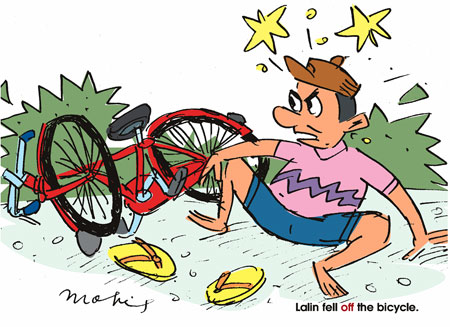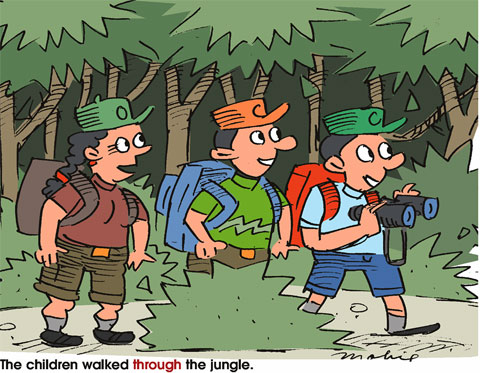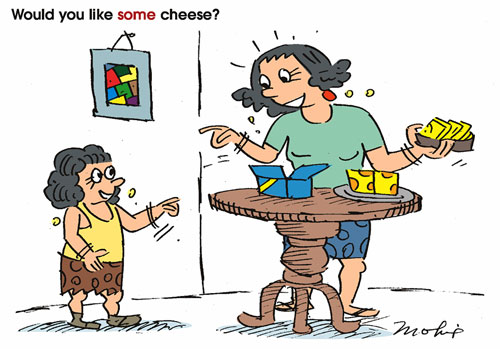|

by R. S. Karunaratne
Prepositions of direction
We use prepositions of direction with verbs such as “walk, climb” and
“jump.”
Father drove us to the airport.

The children ran across the playground.
Shirani walked up to the stage to receive her award.
The tiger climbed up the tree.
The robber jumped over the fence and disappeared.
We use “into” and “out of” for things of volume.
The prisoners were huddled into the cells.
The taxi turned right into Independence Avenue.
The youth jumped into the river to save a child from drowning.
We put all the letters into separate envelopes.
The children slowly walked into the classroom.
The man jumped out of the well with great difficulty.
The soldiers marched out of the barracks.
The lorry ran out of the road.
The tourist came out of the hotel and got into a car.
“onto” is a preposition of movement.
Jothipala stepped onto the platform and sang a song.
The cattle were loaded onto a stationary truck.
The lecturer moved onto the next topic.
The preposition “off” means “away from.”
Keep off the grass.
All the mangoes have dropped off the tree.
Lalin fell off the bicycle.
Do you know where to get off?
We’re not far off Colombo.
The preposition “through” means “from one end to the other.”
The children walked through the jungle.
Can you wade through the water?
It’s difficult to get through the crowd.
Have you ever driven through a tunnel?

The preposition “round” means “in a circular direction.”
Do you know that the moon goes round the Earth?
The actor ran round a tree.
[Activity]
Fill in the blanks with prepositions of direction. Check your answers
with the key.
1. The police rushed ............... the hotel to arrest a suspect.
2. We drove ............... two schools before reaching the church.
3. Janet ran ................... the classroom when she saw a spider.
4. The man jumped .............. his horse to catch the robber.
5. The bullet went .................... the wooden door.
Key:
into 2. past 3. out of 4. off 5. through

Here’s an interesting quiz to improve your vocabulary.
Simply underline the correct answer for each word in bold type. Check
your answers with the key.
1. Your tie is askew. Why don’t you straighten it?
(a) crooked
(b) long
(c) short
2. Little girls are fascinated by baubles, bangles and beads.
(a) rings
(b) trinkets
(c) chains
3. The tourist photographed a bevy of bathing beauties.
(a) two
(b) a small group
(c) a large group
4. Anoma shows a blithe disregard for danger.
(a) foolish
(b) happy
(c) great
5. Father warned Semini to be chary about accepting gifts from
strangers.
(a) grateful
(b) happy
(c) cautious
6. Private bus operators are trying to shift the onus for passenger
safety onto the Government.
(a) responsibility
(b) burden
(c) pleasure
7. Elizabeth Taylor was a thespian of great renown.
(a) writer
(b) actor
(c) poet
8. Some professors bore students with their pedantic lectures.
(a) informal
(b) convincing
(c) stressing trivial points of learning
9. When the Government and trade unions take a pertinacious stand, we
can expect a long strike.
(a) stubborn
(b) friendly
(c) quick
10. The orator with his pontifical style put the audience to sleep.
(a) dramatic
(b) beautiful
(c) stiff
Key:
1. (a) 2. (b) 3. (c) 4. (b) 5. (c) 6. (a) 7. (b) 8. (c) 9. (a) 10.
(c)
Starters:
More on countable and uncountable nouns
We use the word “some” with plural countable nouns. It means “a few.”
I need some stamps.
Would you like some mangoes?
She bought some books at the exhibition.

The secretary gave me some ballpoint pens.
Some students are making a noise.
We use “some” with uncountable nouns as well.
I need some money to buy exercise books.
Would you like some cheese?
There is some cake in the refrigerator.
Here’s some news you might be interested in.
We have some problems with the new computer system.
We use “some” to indicate a large amount or number of something.
I met Savitri in India some time ago.
The managers discussed the problem at some length.
There are some people waiting to see you.
I’ve lost some money.
Some people never learn from their mistakes.
We use “some” to refer to a particular person or thing without
stating exactly which one.
Some lucky man will win the lottery prize.
Some one has broken the window.
There must some way to get there.
Some ballpoint pens are useless.
We don’t meet some of our old friends now.
“Some” or “any”
We use “some” in positive statements.
Some people are crooks.
I met some of the refugees who had lived in camps.
Have some more if you are hungry.
I made some money selling coconuts.
Give him some water.
We use “any’ in questions and negative statements.
Have you got any brothers or sisters?
There aren’t any decent hotels in the town.
Is there any ice-cream in the refrigerator?
I haven’t read any of his novels.
You are not going to have any more troubles with them.
We use many nouns both as countables and uncountables.
I bought a cake. (Countable)
Do you eat cake? (Uncountable)
We ordered a chicken. (Countable)
They ate some chicken. (Uncountable)
We use the following words usually as uncountables.
He went to the bakery to buy some bread.
Jaliya bought a loaf of bread.
It’s nice weather today.
I need some information about this man.
Rani bought some expensive furniture.
His sister has long hair.
Give me some paper to write an essay.
I have some good news for you.
[Activity]
Fill in the blanks with “a, an” and “some.” Check your answers with
the key.
1. Grandfather is reading .......... newspaper.
2. Gunapala is writing .............. letters.
3. I was listening to ............ music when you dropped in.
4. She needs .............. money to buy clothes.
5. We met ................ interesting people at the exhibition.
6. Ananda ate ................ bread and ........... apple.
7. They live in ........... big house.
8. They have a garden with ............ beautiful trees.
9. A: Can you make ........... table?
B: Yes, give me ............ wood.
10. The teacher gave us ............ good advice.
Key:
1. a 2. some 3. some 4. some 5. some 6. some, an 7. a 8. some 9. a,
some 10. some
Irregular past tenses
Fill in the blanks with the irregular past tense of the verbs given
below. Check your answers with the key.
bite, blow, bring, draw, find, forget, grow, keep, lose, put, ride,
smell, teach, throw, hide
1. No one had lived in the house for many years and it
.................. horrible.
2. Dharmapala ................. the ball to Sajith.
3. Sunil ................ his wallet while shopping in Chennai.
4. The children ............... their bicycles all the way to the
school.
5. Dharma ................ the flowers in a jug of water.
6. The ferocious dog ................ him on the leg.
7. Nelun .................. on her tea before drinking it.
8. Father looked everywhere for the office keys but he never
................ them.
9. Sena ................... to send a birthday card to his sister.
10. Tissa ................ the picture of a crow.
11. All the students .................... their pens.
12. Who ............... my pen?
13. Ajantha ................... French in India for two years.
14. Anil ................. about 2 cm last year.
15. Don .................. all his belongings into a big bag.
Key:
smelt 2. threw 3. lost 4. rode 5. kept 6. bit 7. blew 8. found 9.
forgot 10. drew 11. brought 12. hid 13. taught 14. grew 15. put
Expressions of time
Fill in the blanks with the words given below. All the words are
expressions of time. Check your answers with the key.
for ages, now and then, no longer, on time, these days, so far, no
longer, from now on, at once, at the moment, in time, at last
1. I don’t usually eat sweets but .......................... I like
to have an ice-cream.
2. When there is a fire, you must leave the building .............
3. If you hurry, you will be there ......................
4. Strangely, the train to Matara arrived ..........................
5. Thilaka is busy ........................ , please call later.
6. Namasivayam is 100 years old and he can .................... ride
bicycles.
7. I haven’t seen Rani .........................
8. I have been trying to write an essay on the environment for three
hours but ................... I have written only one paragraph.
9. ........................... there are thousands of cars on the roads.
10. ......................... I will try to be a good boy!
11. I got through the examination .........................
12. She is .......................... interested in psychology.
Key:
1. now and then 2. at once 3. in time 4. on time 5. at the moment 6.
no longer 7. for ages 8. so far 9. These days 10. From now on 11. at
last 12. no longer |

